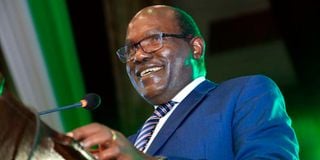Premium
IEBC to conduct poll test run today

IEBC Chairman Wafula Chebukati. Today, June 9, 2022, is the deadline for IEBC to test, verify and deploy the technology, an exercise that must be done at least 60 days before a general election.
The electoral agency is all set to conduct a dry run on the technology expected to be used to transmit the results of the August 9 General Election.
Today is the deadline for the Independent Electoral and Boundaries Commission (IEBC) to test, verify and deploy the technology, an exercise that must be done at least 60 days before a general election.
The exercise will see the IEBC simulate electronic transmission of polls results.
IEBC chairperson Wafula Chebukati said the test run will be conducted at Bomas of Kenya in the presence of representatives of the four presidential candidates.
“You have given us chief agents to work with. You will be invited to be part of that simulation exercise. We want to reiterate that the commission is focused on giving Kenyans a free, fair and credible election. That is what we have been preparing for since the last election,” Mr Chebukati said on Sunday.
Pick out challenges
The dry run is designed to pick out challenges in transmission of electronic copies of election results, which are used to collate provisional election results at the national tallying centre at Bomas.
Electronically transmitted results are only used to generate a provisional tally. The IEBC is required to verify physical statutory forms before declaring the outcome of an election.
Technology has become a key component of the Kenyan electoral process since 2013, when it was first deployed to cure the challenges that led to the 2007/8 post-election violence.
This was bolstered by the 2017 Court of Appeal ruling in the Maina Kiai case, which fortified the role of technology in the electoral process.
The commission initiated procurement of election technology in April 2021, before signing a contract with the vendor in November of the same year.
Kiems kits supply
The Sh4 billion tender for the supply of Kiems kits was awarded to Dutch firm Smartmatic, and includes delivering, installing, testing, commissioning, supporting and maintaining the kits.
“For the purpose of results transmission during the general election, the commission will test and verify the technology in accordance with the law, on or before June 9, 2022,” said the IEBC in a statement.
Section 39 of the Election Act requires that the results of presidential elections in Form 34A be transmitted electronically to constituency and the national tallying centre.
In line with this, all the 53,000 polling stations that will be used for the upcoming elections will be tested for the purpose of results transmission and satellite modems deployed in polling stations without 3G network.
“Once the register has been finalised, the commission will determine how many polling stations are outside 3G network and publish the same,” said Mr Chebukati.
Audit firm KPMG is scrutinising the voter register as well as the raw certified copies of the principal voter register. The IEBC says its database has 22.5 million voters, up from 19.7 million in 2017.





